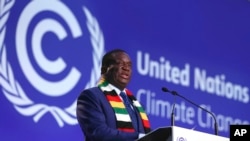President Emmerson Mangagwa claims that he had a “chat” with USA President Joseph Biden, Canadian leader Justin Tredeau and others on the sidelines of the United Nations Climate Change Conference in Glasgow, Scotland, as part of his government’s agenda to re-engage the West, which imposed targeted sanctions on some Zanu PF officials over alleged human rights violations and election rigging.
Presidential spokesperson, George Charamba, posted several videos of President Mnangagwa on his Twitter account in which the Zimbabwean leader speaks about his interaction with world leaders at the climate summit.
In one of the videos, Mnangagwa says, “I’m very pleased that the narratives about Zimbabwe which were misleading, it was an opportunity to put the correct perspective about the situation in Zimbabwe and I’m happy that with all the leaders I interacted with they had a very positive response and are very willing to grow relations with Zimbabwe.
"I had an opportunity to chat with President Joe Biden and the spirit which he has towards Zimbabwe is totally different from what we see from the American Embassy in Harare … He called one of his staffers to say that ‘please make sure that when we get back home I would like to have some discussions with the president of Zimbabwe’.”
Mnangagwa claimed that he had a meeting with a Vatican representative, who told him that they were disappointed about the targeted sanctions imposed on Zanu PF officials.
“… The Vatican is against the sanctions and then I appealed to him that go and convey my message to the Pope and they should also talk to the British and American leadership that these sanctions should go. Again it was a happy exchange with the secretary of state for the Holy Sea.”
United Nations special envoy to Zimbabwe, Alena Douhan, released a report recently calling for the removal of the targeted sanctions. Douhan claimed that the sanctions are hurting ordinary people and businesses.
In her report, she said, "Over the past 20 years, sanctions and various forms of over-compliance with sanctions has had an insidious ripple effect on the economy of Zimbabwe and on the enjoyment of fundamental human rights, including access to health, food, safe drinking water and sanitation, education and employment.
“This situation also limits Zimbabwe’s ability to guarantee the functioning of public institutions, delivery of services, and maintenance of essential infrastructure, and undermines the right to development of the Zimbabwean people and impedes the achievement of the sustainable development goals.”
But government critics believe that Zimbabwe is being devastated by mismanagement and not sanctions.
Recent Afrobarometer survey findings show that a huge majority of Zimbabweans say that government mismanagement, not sanctions, is the main cause of the country’s economic woes.
In a survey involving 1,200 adult citizens conducted by an Afrobarometer team led by the Mass Public Opinion Institution, key findings are that two-thirds (65%) of citizens say the main cause of the county’s economic woes is government mismanagement.
According to Afrobarometer, only three in 10 (29%) see Western sanctions as the main problem. The view that government mismanagement is to blame for economic problems is especially widespread among urban residents (82%) and citizens with postsecondary education (89%). Management of the economy is citizens’ fourth-highest priority for government action, joined in the top 10 by unemployment and the cash crisis.
More than seven in 10 Zimbabweans (72%) describe the country’s economic condition as “fairly bad” or “very bad,” and 62% say the same about their personal living conditions. Only about one-third (35%) of citizens think economic conditions will improve over the next year. Large majorities say the government is performing “fairly badly” or “very badly” on managing the economy (69%), keeping prices stable (78%), and creating jobs (91%).
“Citizens are more likely to blame the country’s economic troubles on government mismanagement, rather than Western sanctions, if they see the country’s economic condition or their personal living conditions as bad, if they expect things to get worse rather than better, and if they think the president and members of Parliament are doing a poor job,” reads part of the report posted on the Afrobarometer website.
Afrobarometer says as might be expected, respondents who “feel close to” the opposition MDC-Chamisa party overwhelmingly (92%) attribute economic problems to government mismanagement, a view shared by just 36% of ZANU-PF supporters.




